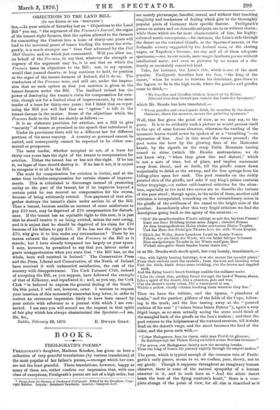OBJECTIONS TO THE LAND BILL.
[To THE EDITOR OF THE "SPUTA:FDIC] SIE,—In your article of Saturday last on "Objections to the Land Bill" you say, "the argument of the Freeman's Journal, the organ of the tenant-right farmers, that the option allowed to the farmers for commuting the Custom into a lease of thirty-one years will lead to the universal grant of leases binding the tenant too strin- gently, is a much stronger one" than that advanced by the Pall Mall Gazette, and on which you commented. Will you allow me, on behalf of the Freeman, to say that, whatever the strength or cogency of the argument may be, it is not that on which the Freeman bases its objections to the Bill ; nor, in my opinion, would that journal deserve, or long continue to hold, its position as the organ of the tenant-farmers of Ireland, did it do so. The conductors of the Freeman were, and still are, under the impres- sion that no such option as that you mention is given to the tenant-farmers under the Bill. The landlord indeed has the power of destroying the tenant's claim for compensation for evic- tion, though not for a limited class of improvements, by the mere tender of a lease for thirty-one years ; but I think that on reper- using the Bill you will find that no " option" is left to the tenant-farmer in the matter. Some of the objections which the Freeman finds to the Bill are shortly as follows :—
It is an elaborate provision for eviction, not a Bill to give " security " of tenure as promised in the speech that introduced it.
Under its provisions there will be a different law for different portions of the same country. A country so governed cannot be united, and consequently cannot be expected to be either con- tented or prosperous.
The mere tender, whether accepted or not, of a lease for thirty-one years bars the right of the tenant to compensation for eviction. Either the tenant has or has not this right. If he has it, no lapse of time should destroy it. If he has it not, it is unjust to recognize it at all in the Bill.
The scale for compensation for eviction is limited, and at the same time includes compensation for certain classes of improve- ments. This is calculated to discourage instead of promoting outlay on the part of the tenant, for if he improves beyond a certain point he can recover no compensation for the excess, because of being arbitrarily evicted. Non-payment of rent alto- gether destroys the tenant's claim under section iii. of the Bill. Thus a tenant, because unable on account of some misfortune to pay £10 rent, may be deprived of £70 compensation for disturb- ance. If the tenant has an equitable right to this sum, it is just that he should receive it on being evicted, minus the rent owing, and it is unjust that he should be deprived of his claim for £70 because of his failure to pay £10. If he has not the right to the 170, why give it to him under any circumstances ? These by no means exhaust the objections of the Freeman to the Bill as it stands ; but I have already trespassed too largely on your space. I may, however, be permitted to say that you labour under a grave misapprehension when you state that "the Bill has, on the whole, been well received in Ireland." The Conservative Press and the Press, Liberal and Conservative, of the North of Ireland have received it with unbounded satisfaction, the rest of the country with disappointment. The Cork Farmers' Club, instead of accepting the Bill, as you suppose, have followed the example of that of Kilkenny, and repudiated it ; and, as you say, the Cork Club "is believed to express the general feeling of the South." On this point, I will not, however, enter. I venture to request your insertion of this necessarily somewhat long letter, in order to correct an erroneous impression likely to have been caused by your article with reference to a journal with which I am con- nected. I am sure you will accord me the request in that spirit of fair play which has always characterized the Spectator.-1 am, Sir, &c.,


































 Previous page
Previous page